S. Evan Townsend's Blog, page 121
September 18, 2013
Movie Review: World War Z
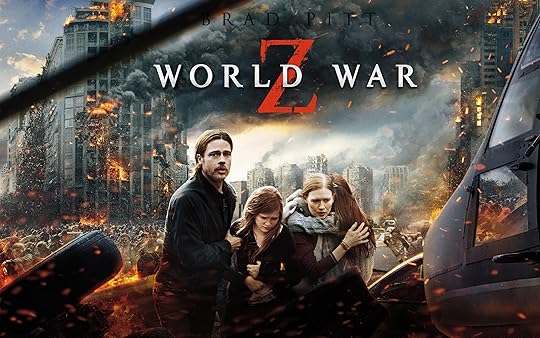 Back in February I had a post on this blog about how I "don't do horror." And I still don't but I decided to get World War Z from Netflix despite it being labeled a horror movie. It wasn't really a horror movie, more like an action thriller with some horror aspects. And it was a pretty good movie with intense action, scary but not over-the-top gory moment, and it pulled at your heartstrings just enough but not too much. Brad Pitt stars as a retired Jack Bauer type but he worked for the UN which doesn't seem very authentic (what would the UN need with a hard core kick ass guy?). The movie builds the tension starting with an family outing gone horribly wrong. It gives you clues before revealing exactly what's happening. It's a frightening scenario. The movie escalates from there with startling imagery and fast-paced action. It does, however, suffer from something a lot of action movies and books seem to have: the climax is less exciting than what came earlier (viz:
Olympus has Fallen
). And the ending, once they set it up, became quite predictable.
Back in February I had a post on this blog about how I "don't do horror." And I still don't but I decided to get World War Z from Netflix despite it being labeled a horror movie. It wasn't really a horror movie, more like an action thriller with some horror aspects. And it was a pretty good movie with intense action, scary but not over-the-top gory moment, and it pulled at your heartstrings just enough but not too much. Brad Pitt stars as a retired Jack Bauer type but he worked for the UN which doesn't seem very authentic (what would the UN need with a hard core kick ass guy?). The movie builds the tension starting with an family outing gone horribly wrong. It gives you clues before revealing exactly what's happening. It's a frightening scenario. The movie escalates from there with startling imagery and fast-paced action. It does, however, suffer from something a lot of action movies and books seem to have: the climax is less exciting than what came earlier (viz:
Olympus has Fallen
). And the ending, once they set it up, became quite predictable.Another problem I had with the movie was military hardware. There was a helicopter in the movie supposedly U.S. military that I know is not in the U.S. military inventory. And the Israeli military was using the same helicopter (might have been the same aircraft repainted) A C-130 cargo plane (the actor was credited as "C-130 pilot") was not a C-130 cargo plane. The plane they used was close but it was too skinny and the nose was all wrong. I suspect it was an An-12 Soviet-era cargo plane.
I gave World War Z four starts on Netflix because of the intense action sequences that kept me on the edge of my recliner. And don't be scared off by its "horror" label. The horror and gore are kept in check and the action is what this movie is all about.
Published on September 18, 2013 04:54
September 17, 2013
Pet Grammar Peeves
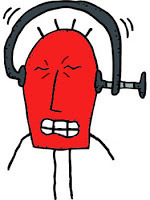 I have this pet peeve when it comes to grammar. Well, okay, I have more than one especially in these days of social media where people who are supposedly educated don't know the difference between "to" and "too" and "your" and "you're." And while I'm a pretty bad speller (and the typo king) I do try to keep my grammar accurate and correct (although I have typo'ed "to" for "too").
I have this pet peeve when it comes to grammar. Well, okay, I have more than one especially in these days of social media where people who are supposedly educated don't know the difference between "to" and "too" and "your" and "you're." And while I'm a pretty bad speller (and the typo king) I do try to keep my grammar accurate and correct (although I have typo'ed "to" for "too").My peeve is the misuse of "I" and "me." As in "He's taller than me" and "She gave the money to Jim and I." Both of those are wrong and exactly backwards. I think what confuses people is that in some cases "I" is correct and in some "me" is but they don't know which is which. So here's how I remember (without getting into that "I" is used when it is the subject of a sentence and "me" when it's the object). If you can take out the other person you wouldn't say "She gave the money to I" (at least I hope not) but "She gave the money to me." So when you have Jim (or someone else) added, you still use "me": "She gave the money to Jim and me."
To know if you should use "I" add a verb: "He's taller than I am." You wouldn't say (I hope) "He's taller than me am" so you'd use "I" there, just don't say the "am" (or do, it's perfectly acceptable).
People look at me funny when I said things like "He's taller than I" because they are sure I'm wrong. But I'm not.
Which brings up another peeve: "like" and "such as." This is so abused I don't even know if we can save it. If you are comparing things that are similar but not the same, use "like": "The Chevy Malibu is a mid-sized car like the Honda Accord, Hyundai Sonota, and Dodge Dart." If you are comparing things that include all the items, use "such as": "Mid-sized cars such as the Chevy Malibu Honda Accord, Hyundai Sonota, and Dodge Dart are popular with young families." Use "like" for comparisons, use "such as" for encompassing lists.
Okay, done ranting.
Published on September 17, 2013 12:17
September 15, 2013
Huskies Beat Illinois
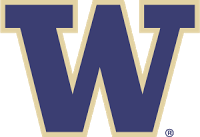 This is the first time in years the University of Washington Huskies have been in the AP Top 25 poll for more than one week. In the past they beat some time they weren't expected to (such as USC when they were ranked #2), pop into the #25 position, and then then next week get blown out buy some team they should have been able to beat. But the Huskies have been ranked since they beat then #19 Boise State.
This is the first time in years the University of Washington Huskies have been in the AP Top 25 poll for more than one week. In the past they beat some time they weren't expected to (such as USC when they were ranked #2), pop into the #25 position, and then then next week get blown out buy some team they should have been able to beat. But the Huskies have been ranked since they beat then #19 Boise State.The Dawgs had a bye last week (I tell you, two weeks is a long wait for a football game) and stayed in the poll (even moved up a bit) and then this week they traveled to Chicago to defeat the University of Illinois Illini.
The first half the Huskies were hurt by penalties that they should have been too smart to get and by two fumble/turnovers by the same player (I noticed he didn't get back in the game). Still at the half the Huskies were ahead 10-3. But the third quarter the Huskies dominated, making a touchdown in less than 2 minutes after kickoff. Illinois was able to get a touchdown but the Huskies answered in kind and soon the score was 31-10. But the Illini, to their credit, came back and tightened the score to 31-24 giving them the ability to tie the game with just one touchdown.
But a Husky interception (of an illegal 2nd forward pass in one play) shut down the Illini's hope, and the game ended 34-24.
And this morning, the Huskies are ranked #17. Their third week in the top 25.
Next week the Huskies play Idaho State at home. The Bengals are also 2-0 but they are an FCS team (unlike the two other universities in Idaho).
Published on September 15, 2013 11:52
September 13, 2013
Movie Review: Star Trek into Darkness
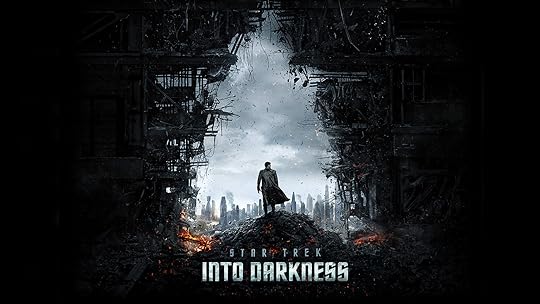 I suppose I should explain my point of view before jumping into this movie review of
Star Trek into Darkness
. And yes, this movie came out in May and I just watched it because I watch most movies via Netflix Blu-ray discs because I really don't want to pay to see most movies in the theater when I can't pause them for a bathroom break.
I suppose I should explain my point of view before jumping into this movie review of
Star Trek into Darkness
. And yes, this movie came out in May and I just watched it because I watch most movies via Netflix Blu-ray discs because I really don't want to pay to see most movies in the theater when I can't pause them for a bathroom break.If you don't want to hear my explanation of how I approach Star Trek into Darkness, skip the next paragraph.
I've been a fan of "Star Trek" in its various configurations since seeing the original series (TOS in Trekker argot) in first run when I was seven and eight years old. I didn't get to watch it much because no one else in the family liked it and being the youngest my opinion of what to watch was taken into consideration last. In other words, if no one else was watching the single television in the house, I could watch "Star Trek." I really didn't get into Star Trek heavily until we got a third commercial television channel in the early '70s and starting in about 1974 they started running Star Trek: TOS at 4:00 P.M. everyday which was not long after I got home from school. I have, as far as I can determine, seen every episode of every Star Trek series except one of "Deep Space Nine" (in it's first run I was preparing a hellacious assignment for a Chemical Engineering class and somehow missed it in reruns). I have seen every Star Trek movie from the good (Star Trek II: The Wrath of Kahn), the bad (Star Trek The Motion Picture) and the ugly (Star Trek V: Where No Man Has Gone Before). So I am a Star Trek fan. Now I'm not crazy. I have never been to a convention. I have never dressed up like a crew member or an alien. I have not bought every episode on DVD (I do have some favorites from TOP on VHS but . . . well, you know). So I am an old-fashioned Star Trek fan. My protagonist of Book of Death is also a fan.
Now, the movie. Star Trek into Darkness is well-written, visually interesting, well made, the direction is very good, and it is exciting and fun. It's just not a Star Trek movie. If I forgive the violence the J.J. Abrams Star Trek movies do to the Star Trek universe, I can enjoy them. J.J. Abrams knows how to fill the screen with exciting imagery. I do enjoy the shout outs to old Star Trek memes (and being a fan, I recognize them). If I was looking at these movies not from the perspective of a Star Trek fan, I would still have some quibbles (A spaceship is not going to do well underwater and those big heavy things in engineering wouldn't be in a spaceship where reduction of mass is all-important) but they are still good, entertaining movies. It's sort as if they are fictional stories written by people who live in the Star Trek universe. Like if Sulu decided to write a novel. But he'd at least have his science right.
I gave Star Trek into Darkness four stars on Netflix which I think it earned simply on the value of its entertainment. But it's not a Star Trek movie.
Published on September 13, 2013 13:56
September 11, 2013
Fell Into that Trap . . .
 A bit ago I wrote on this blog about "Technology Traps." That is, we get so reliant upon technology that if it is taken away, we're in trouble.
A bit ago I wrote on this blog about "Technology Traps." That is, we get so reliant upon technology that if it is taken away, we're in trouble.I had a bit of that happen to me on my recent vacation to Glacier National Park. I have AT&T for my cell phone carrier and about 10 miles north of the town of Browning, Montana, my cell phone service went away (locals said Verizon or Sprint had coverage). Then at the hotel there was supposed to be WiFi in the lobby. But it died at about 6:00 P.M. on the first day there and never really came back reliably enough to use it.
I needed to go to Kalispell, Montana, and I knew approximately where it was but I didn't know how far away it was. I was supposed to be there at 10:00 A.M. and needed to know what time I needed to leave. I didn't have paper maps (who uses paper maps anymore?) so I had no idea how to figure this out. Normally I'd pull up Goggle maps and go to town.
Luckily my car's navigation system still worked so I was able to use it to figure out that Kalispell was 130 miles away. Then I figured how much time I should allot for the trip (I underestimated, not realize the last 40 or so miles were going to be in slow traffic).
After three days with basically no internet, I sat in Starbucks in Kalispell catching up on . . . everything.
Did I learn anything? Will I take paper maps with me next time? Probably not. But I did learn that it's hard to live without the internet when you've grown to rely on it.
Published on September 11, 2013 08:30
September 10, 2013
Mini-Vacation to Glacier National Park, Part Two
Yesterday I posted pictures from my trip to Glacier National Park. I got almost through the first of three days, and the most picture-intensive day (because it was the day with the best weather).
Heading back east from Lake McDonald it wasn't raining and we saw things we missed going west due to rain and low clouds, such as this valley and mountain view:
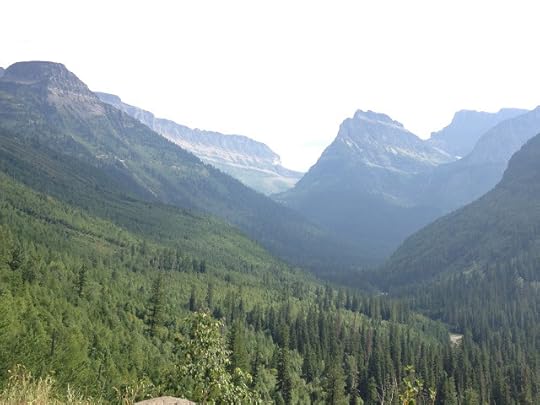 Valley and MountainsThe sky what gray with clouds (looking white in this picture) and the air was hazy with the remainders of low clouds.
Valley and MountainsThe sky what gray with clouds (looking white in this picture) and the air was hazy with the remainders of low clouds.
Near the top of the Going to the Sun Road (which is at Logan Pass and the Continental Divide), there is "the loop" where the road makes a hairpin turn. We stopped to take this picture of a mountain and trees burned in a forest fire. Again, the haze makes the distant mountain fuzzy.
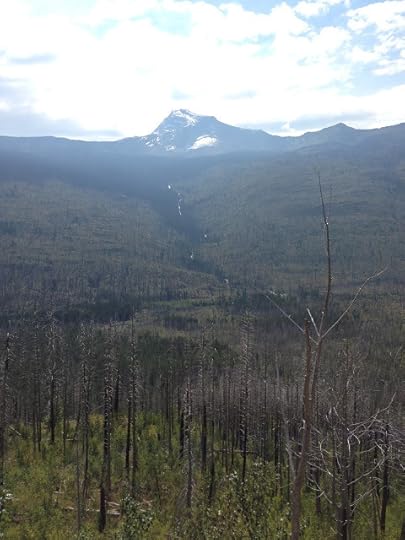 Mountain and Fire DamageThen next morning we woke up to low clouds and rain. This was the view out our hotel room's window.
Mountain and Fire DamageThen next morning we woke up to low clouds and rain. This was the view out our hotel room's window.
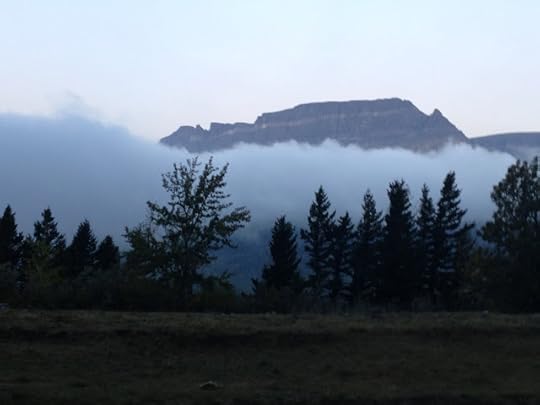 Cloudy Rainy DayWe decided to head for Many Glacier (no typo) and we're glad we did as it sits on the Swiftcurrent Lake.
Cloudy Rainy DayWe decided to head for Many Glacier (no typo) and we're glad we did as it sits on the Swiftcurrent Lake.
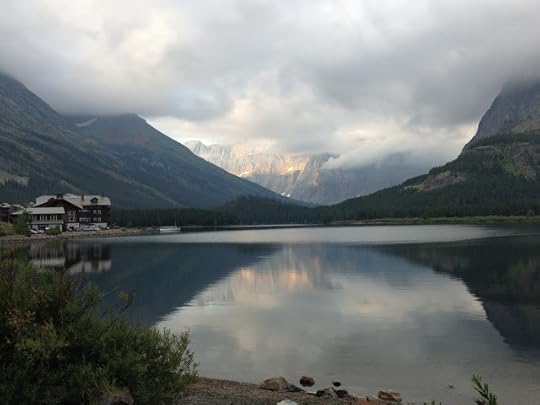 Swiftcurrent Lake and Many Glacier HotelThe Many Glacier Hotel was very pretty with a vintage look inside and out and what, with good weather, was most likely a very lovely view.
Swiftcurrent Lake and Many Glacier HotelThe Many Glacier Hotel was very pretty with a vintage look inside and out and what, with good weather, was most likely a very lovely view.
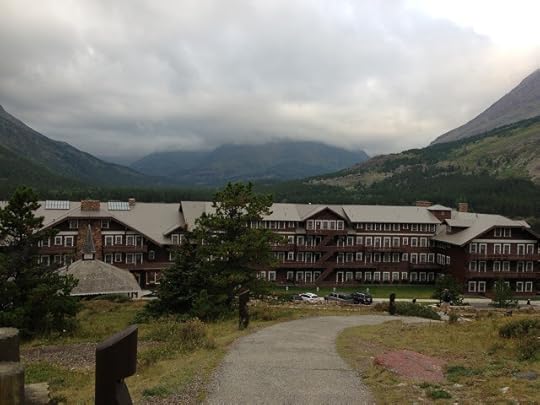 Many Glacier Hotel
Many Glacier Hotel
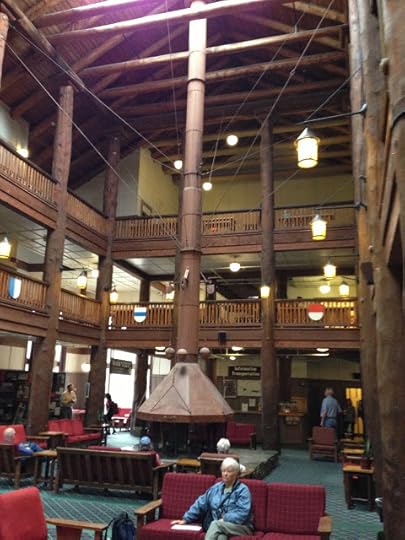 Many Glacier Hotel Lobby We then spent that afternoon in the lobby trying to get the WiFi to work (it didn't).
Many Glacier Hotel Lobby We then spent that afternoon in the lobby trying to get the WiFi to work (it didn't).
The next day was our last day in Glacier Park but we woke to low clouds and rain. We waited until afternoon when it seemed to be clearing some to go back up the Going to the Sun Road. We did see some blue sky.
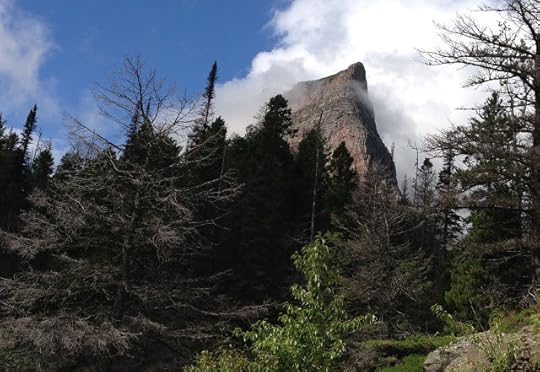 Blue SkyAnd we went back to the Wild Goose Island overlook.
Blue SkyAnd we went back to the Wild Goose Island overlook.
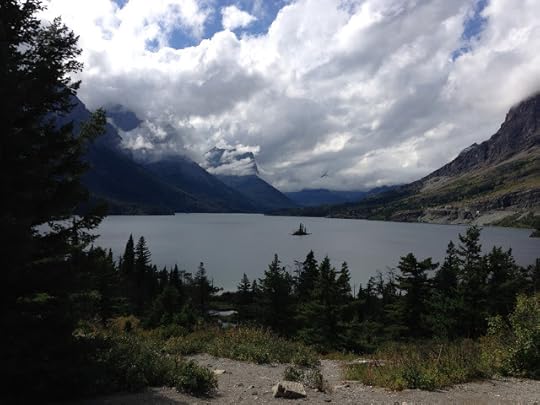 Wild Goose Island Last DayWhich looked different than from the first day.
Wild Goose Island Last DayWhich looked different than from the first day.
And finally, one last view of St. Mary Lake before we headed back to the hotel for the night.
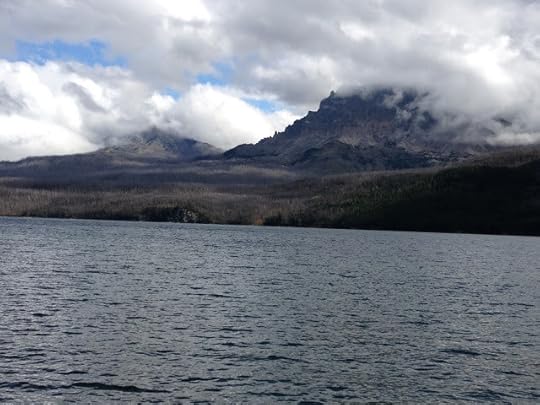 St. Mary Lake Last DayI'm already thinking about returning, perhaps earlier in the season to get better weather and better views. Glacier National Park is an amazing spot hidden in Northern Montana.
St. Mary Lake Last DayI'm already thinking about returning, perhaps earlier in the season to get better weather and better views. Glacier National Park is an amazing spot hidden in Northern Montana.
Heading back east from Lake McDonald it wasn't raining and we saw things we missed going west due to rain and low clouds, such as this valley and mountain view:
 Valley and MountainsThe sky what gray with clouds (looking white in this picture) and the air was hazy with the remainders of low clouds.
Valley and MountainsThe sky what gray with clouds (looking white in this picture) and the air was hazy with the remainders of low clouds.Near the top of the Going to the Sun Road (which is at Logan Pass and the Continental Divide), there is "the loop" where the road makes a hairpin turn. We stopped to take this picture of a mountain and trees burned in a forest fire. Again, the haze makes the distant mountain fuzzy.
 Mountain and Fire DamageThen next morning we woke up to low clouds and rain. This was the view out our hotel room's window.
Mountain and Fire DamageThen next morning we woke up to low clouds and rain. This was the view out our hotel room's window. Cloudy Rainy DayWe decided to head for Many Glacier (no typo) and we're glad we did as it sits on the Swiftcurrent Lake.
Cloudy Rainy DayWe decided to head for Many Glacier (no typo) and we're glad we did as it sits on the Swiftcurrent Lake. Swiftcurrent Lake and Many Glacier HotelThe Many Glacier Hotel was very pretty with a vintage look inside and out and what, with good weather, was most likely a very lovely view.
Swiftcurrent Lake and Many Glacier HotelThe Many Glacier Hotel was very pretty with a vintage look inside and out and what, with good weather, was most likely a very lovely view. Many Glacier Hotel
Many Glacier Hotel Many Glacier Hotel Lobby We then spent that afternoon in the lobby trying to get the WiFi to work (it didn't).
Many Glacier Hotel Lobby We then spent that afternoon in the lobby trying to get the WiFi to work (it didn't).The next day was our last day in Glacier Park but we woke to low clouds and rain. We waited until afternoon when it seemed to be clearing some to go back up the Going to the Sun Road. We did see some blue sky.
 Blue SkyAnd we went back to the Wild Goose Island overlook.
Blue SkyAnd we went back to the Wild Goose Island overlook.
 Wild Goose Island Last DayWhich looked different than from the first day.
Wild Goose Island Last DayWhich looked different than from the first day.And finally, one last view of St. Mary Lake before we headed back to the hotel for the night.
 St. Mary Lake Last DayI'm already thinking about returning, perhaps earlier in the season to get better weather and better views. Glacier National Park is an amazing spot hidden in Northern Montana.
St. Mary Lake Last DayI'm already thinking about returning, perhaps earlier in the season to get better weather and better views. Glacier National Park is an amazing spot hidden in Northern Montana.
Published on September 10, 2013 13:12
September 9, 2013
Mini-Vacation to Glacier National Park Part One
I promised more pictures in my last blog post if the internet cooperated. It didn't (I first tried posting that Thursday, ended up posting it Sunday night when I got home and had good internet). So I guess I'll post some pictures now, more later.
All these pictures were taken with an iPhone 5. Also, the weather was not cooperative and we didn't see much blue sky. Here is a selection of the best pictures of the approximately 80 pictures I took (thank heaven for digital). As my friend Gavin Seim would point out, they are "snapshots" but even then I tried to take the best pictures I could.
We arrived later than planned due to road construction delays and me taking a wrong turn. By the time we had dinner and got to our hotel parking lot, it was dark. And we were greeted by this fellow: a coyote. He didn't seem to want to come into the lighted parking lot so I snapped his picture but due to low light and zooming it, the picture is very poor quality. I wondered at that point how much wildlife we'd encounter. And actually, it wasn't much.
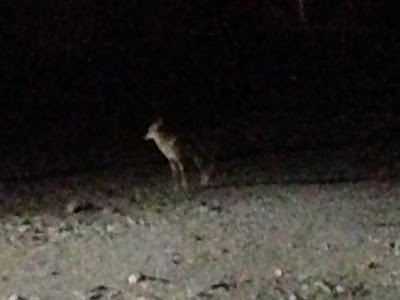 Parking Lot CoyoteThe next morning we drove into the park from the east side on the Going to the Sun Road and when we saw the scene below was when we first got a clue we were into something special. We stopped by the road to take this picture of St. Mary Lake along with some of the mountains in Glacier National Park.
Parking Lot CoyoteThe next morning we drove into the park from the east side on the Going to the Sun Road and when we saw the scene below was when we first got a clue we were into something special. We stopped by the road to take this picture of St. Mary Lake along with some of the mountains in Glacier National Park.
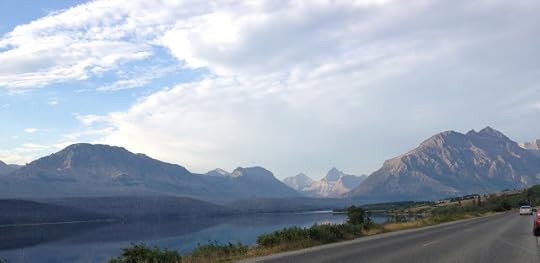 St. Mary Lake and MountainsAfter seeing that we stopped to take a picture of Wild Goose Island in St. Mary Lake and that picture is here. Glacier National Park was named so because of the abundance of glaciers on the mountains in the area. This was the first glacier we saw that morning.
St. Mary Lake and MountainsAfter seeing that we stopped to take a picture of Wild Goose Island in St. Mary Lake and that picture is here. Glacier National Park was named so because of the abundance of glaciers on the mountains in the area. This was the first glacier we saw that morning.
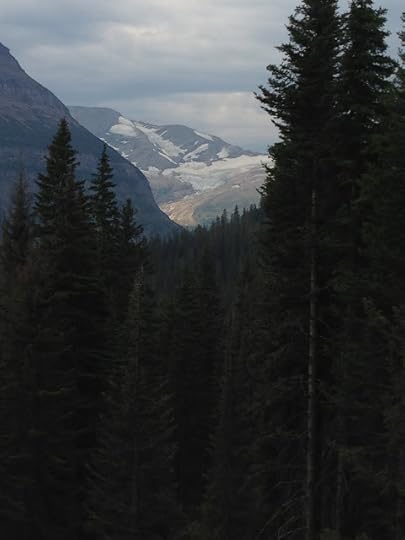 Glacier in Glacier National Park The mountains and valleys of Glacier Park are just breath-taking. Verdant low-lands rise swiftly to rocky, craggy mountains, as in this picture:
Glacier in Glacier National Park The mountains and valleys of Glacier Park are just breath-taking. Verdant low-lands rise swiftly to rocky, craggy mountains, as in this picture:
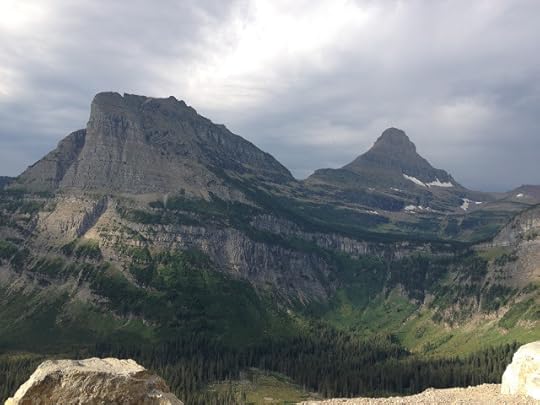 Mountains and Valley in Glacier National ParkBecause of the low clouds, rain, and haze, it made the lighting in some spots interesting. This picture seems to capture it best (taken at Logan Pass on the Continental Divide at the visitor center parking lot).
Mountains and Valley in Glacier National ParkBecause of the low clouds, rain, and haze, it made the lighting in some spots interesting. This picture seems to capture it best (taken at Logan Pass on the Continental Divide at the visitor center parking lot).
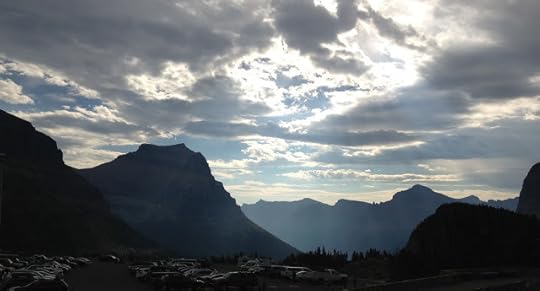 Logan Pass Visitor Center Parking LotThere are still more valleys to see as you descend west-bound from Logan Pass. It started raining which added another dimension to our pictures' lighting.
Logan Pass Visitor Center Parking LotThere are still more valleys to see as you descend west-bound from Logan Pass. It started raining which added another dimension to our pictures' lighting.
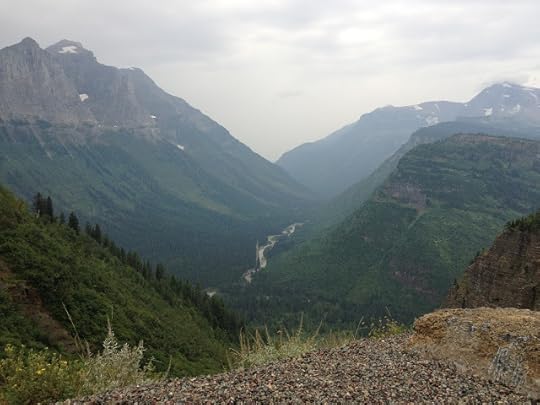 Glacier National Park valleyIt rained until after lunch at the nearly west-end of the park and the Going to the Sun Road. But then the sun came out and we actually saw some blue patches in the sky at the west end of Lake McDonald.
Glacier National Park valleyIt rained until after lunch at the nearly west-end of the park and the Going to the Sun Road. But then the sun came out and we actually saw some blue patches in the sky at the west end of Lake McDonald.
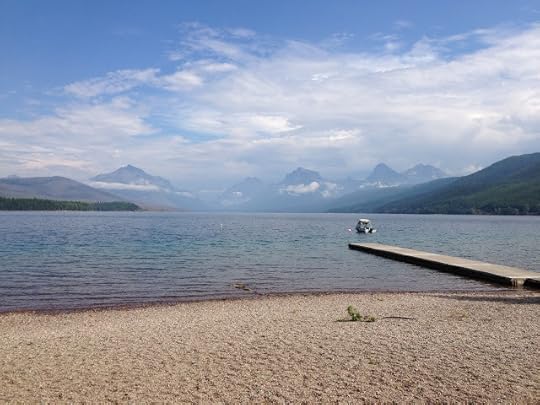 Lake McDonald at Apgar We turned around and headed east on the Going to the Sun Road, stopping at Lake McDonald Lodge to snap this picture.
Lake McDonald at Apgar We turned around and headed east on the Going to the Sun Road, stopping at Lake McDonald Lodge to snap this picture.
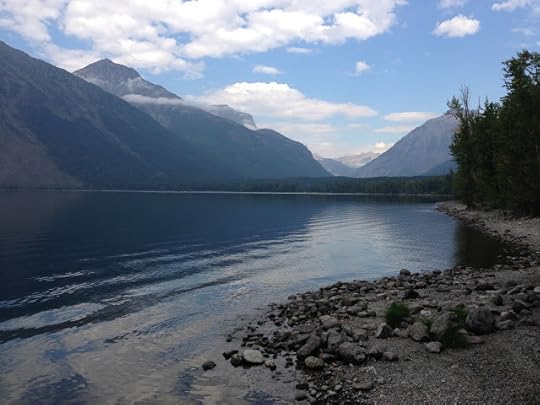 Lake McDonald at Lake McDonald LodgeWhen I first thought of going to Glacier National Park I thought "Mountains, trees, lakes, hmph, a Jedi seeks not these things." No, what I thought was "Been there, done that." But what amazing mountains that seem to claw at the clouds with their jagged sides, what pretty trees (as the leaves were beginning to change on the aspen and the evergreens were everywhere) and what blue, calm, pristine lakes.
Lake McDonald at Lake McDonald LodgeWhen I first thought of going to Glacier National Park I thought "Mountains, trees, lakes, hmph, a Jedi seeks not these things." No, what I thought was "Been there, done that." But what amazing mountains that seem to claw at the clouds with their jagged sides, what pretty trees (as the leaves were beginning to change on the aspen and the evergreens were everywhere) and what blue, calm, pristine lakes.
More pictures tomorrow from this amazing place.
All these pictures were taken with an iPhone 5. Also, the weather was not cooperative and we didn't see much blue sky. Here is a selection of the best pictures of the approximately 80 pictures I took (thank heaven for digital). As my friend Gavin Seim would point out, they are "snapshots" but even then I tried to take the best pictures I could.
We arrived later than planned due to road construction delays and me taking a wrong turn. By the time we had dinner and got to our hotel parking lot, it was dark. And we were greeted by this fellow: a coyote. He didn't seem to want to come into the lighted parking lot so I snapped his picture but due to low light and zooming it, the picture is very poor quality. I wondered at that point how much wildlife we'd encounter. And actually, it wasn't much.
 Parking Lot CoyoteThe next morning we drove into the park from the east side on the Going to the Sun Road and when we saw the scene below was when we first got a clue we were into something special. We stopped by the road to take this picture of St. Mary Lake along with some of the mountains in Glacier National Park.
Parking Lot CoyoteThe next morning we drove into the park from the east side on the Going to the Sun Road and when we saw the scene below was when we first got a clue we were into something special. We stopped by the road to take this picture of St. Mary Lake along with some of the mountains in Glacier National Park. St. Mary Lake and MountainsAfter seeing that we stopped to take a picture of Wild Goose Island in St. Mary Lake and that picture is here. Glacier National Park was named so because of the abundance of glaciers on the mountains in the area. This was the first glacier we saw that morning.
St. Mary Lake and MountainsAfter seeing that we stopped to take a picture of Wild Goose Island in St. Mary Lake and that picture is here. Glacier National Park was named so because of the abundance of glaciers on the mountains in the area. This was the first glacier we saw that morning.
 Glacier in Glacier National Park The mountains and valleys of Glacier Park are just breath-taking. Verdant low-lands rise swiftly to rocky, craggy mountains, as in this picture:
Glacier in Glacier National Park The mountains and valleys of Glacier Park are just breath-taking. Verdant low-lands rise swiftly to rocky, craggy mountains, as in this picture: Mountains and Valley in Glacier National ParkBecause of the low clouds, rain, and haze, it made the lighting in some spots interesting. This picture seems to capture it best (taken at Logan Pass on the Continental Divide at the visitor center parking lot).
Mountains and Valley in Glacier National ParkBecause of the low clouds, rain, and haze, it made the lighting in some spots interesting. This picture seems to capture it best (taken at Logan Pass on the Continental Divide at the visitor center parking lot). Logan Pass Visitor Center Parking LotThere are still more valleys to see as you descend west-bound from Logan Pass. It started raining which added another dimension to our pictures' lighting.
Logan Pass Visitor Center Parking LotThere are still more valleys to see as you descend west-bound from Logan Pass. It started raining which added another dimension to our pictures' lighting. Glacier National Park valleyIt rained until after lunch at the nearly west-end of the park and the Going to the Sun Road. But then the sun came out and we actually saw some blue patches in the sky at the west end of Lake McDonald.
Glacier National Park valleyIt rained until after lunch at the nearly west-end of the park and the Going to the Sun Road. But then the sun came out and we actually saw some blue patches in the sky at the west end of Lake McDonald. Lake McDonald at Apgar We turned around and headed east on the Going to the Sun Road, stopping at Lake McDonald Lodge to snap this picture.
Lake McDonald at Apgar We turned around and headed east on the Going to the Sun Road, stopping at Lake McDonald Lodge to snap this picture. Lake McDonald at Lake McDonald LodgeWhen I first thought of going to Glacier National Park I thought "Mountains, trees, lakes, hmph, a Jedi seeks not these things." No, what I thought was "Been there, done that." But what amazing mountains that seem to claw at the clouds with their jagged sides, what pretty trees (as the leaves were beginning to change on the aspen and the evergreens were everywhere) and what blue, calm, pristine lakes.
Lake McDonald at Lake McDonald LodgeWhen I first thought of going to Glacier National Park I thought "Mountains, trees, lakes, hmph, a Jedi seeks not these things." No, what I thought was "Been there, done that." But what amazing mountains that seem to claw at the clouds with their jagged sides, what pretty trees (as the leaves were beginning to change on the aspen and the evergreens were everywhere) and what blue, calm, pristine lakes.More pictures tomorrow from this amazing place.
Published on September 09, 2013 11:27
September 8, 2013
Glacier National Park
Vacationing at Glacier National Park in northern Montana. Here's a picture I took Thursday. More to come if Internet cooperates.
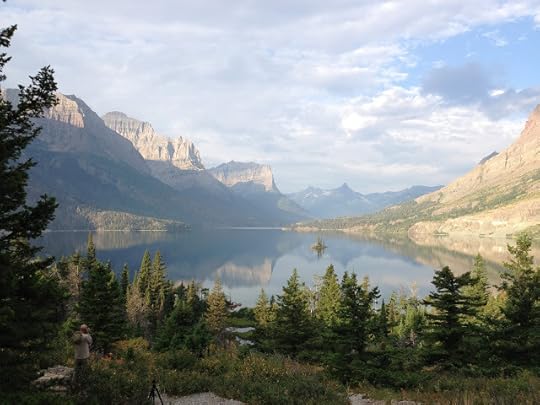

Published on September 08, 2013 17:32
September 4, 2013
Free Peaches
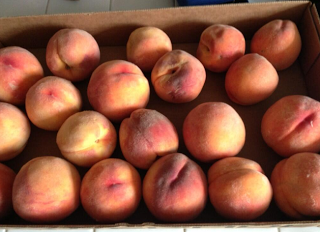 I love fruit. I really like oranges and peaches and pears (although it seems pears are hit-and-miss, they are perfectly ripe for about half an hour, otherwise they taste like wood or are much). So when I had a chance to get some peaches right off the farm, I took it.
I love fruit. I really like oranges and peaches and pears (although it seems pears are hit-and-miss, they are perfectly ripe for about half an hour, otherwise they taste like wood or are much). So when I had a chance to get some peaches right off the farm, I took it.Last week I was driving south of where I live to interview a man for a freelance writing assignment. I sort of took the back way (that was shorter) and on the way there I passed a sign pointing right that said "Peaches." And I thought "Hmmmm, peaches."
So on the way back from the very successful interview (which turned into a great story), I saw the sign again, except this time pointing left (because I was going the opposite direction). So I turned left and followed the road.
Now in that part of the county, the roads tend to be a) straight as an arrow and b) one mile apart. So I kept going (west, incidentally, away from home) and passed one road (one mile) and then passed two roads (two miles) and kept wondering if I'd either missed it or it was a long ways down this road. I was driving between row-crop fields and fruit orchards on this west-heading vector.
Finally (and looking at my gas gauge) I decided to give up and turn around. I pulled to the side of the road and was about to turn when I saw a sign ahead that said . . . well, I couldn't read it. I drove a bit closer and sure enough it said, "Peaches" and the arrow pointed right (or north). "I must be getting close," I thought. So I turned right and drove down that road maybe a half a mile. I was just about to give up again (still nervously looking at my gas gauge that was hovering near empty) when I saw a sign saying the peaches were to the right, now. I turned. It was a gravel road with a warning sign: "Primitive Road: No Warnings." But I kept going (albeit slowly to minimize rock chips on my car). Went up a hill and behold, there was a sign: "Peaches" pointing into a farmstead. So I pulled in, parked the car by the metal shop, and got out. The door on the shop was open and a sign by the door said (you guessed it) "Peaches."
I walked toward the shop and this girl about 15 or 16 years old comes out. Pretty little thing with long red hair with a slight curl to it. She had braces on her teeth. "You want some peaches?" she asked.
"You suckered me in for about five miles," I said, exaggerating sliglty, "so you'd better have peaches."
She didn't react but she said, "They're in here." I followed her into the shop. "They are $20 a box or 80 cents a pound," she said pointing to a large commercial refrigerator with glass doors. Inside I could see boxes or peaches.
"I don't need a box," I said.
She picked up a flat box (like they put stuff in at Costco) and started putting peaches in it, inspecting each one and rejecting those she didn't think were up to snuff. Then she asked if that was enough when the box was full. I said it was so she weighed it on a huge industrial scale. It came to 7 pounds (with the box). So I was pulling out my wallet when she handed the box to me and said, "Take 'em."
I said, "What?"
She said "Take 'em. It's not worth it and you didn't buy a whole box."
I said, "Are you sure?"
She replied, "Yes."
So I thanked her and said that that was defiantly worth getting sucked into from five miles away.
I put the peaches on the floor of the passenger side of my car, and drove home. Did not run out of gas.
And the peaches are amazing.
Published on September 04, 2013 08:30
September 3, 2013
Washington Huskies are Ranked!
 I've been wanting to blog about the University of Washington Huskies' victory over the Boise State Broncos since Sunday morning (the game was late Saturday). But I wanted to wait until the new AP poll came out to see if after beating the #19 Broncos the Huskies were ranked. But because of Labor Day (apparently) the poll which normally comes out Sunday evening came out just this morning.
I've been wanting to blog about the University of Washington Huskies' victory over the Boise State Broncos since Sunday morning (the game was late Saturday). But I wanted to wait until the new AP poll came out to see if after beating the #19 Broncos the Huskies were ranked. But because of Labor Day (apparently) the poll which normally comes out Sunday evening came out just this morning.The game Saturday evening was held in the renovated Husky Stadium, the first game in the new stadium and the first game on campus since November 5, 2011 (home games were played at the Seahawks' venue, Century Link Field in the interim). Going in the Huskies were considered a bit of an underdog since Boise has been a very powerful team and was ranked where the Huskies were not. Also, in their last meeting, last year in the Las Vegas Bowl, Boise won 28-26.
On the first play of the game, Huskie quarterback Keith Price threw an interception. But after that hiccup it was nearly all Huskies all evening. A interception got the Dawgs the ball back and they marched it in for a touchdown. They help the Broncos to two field goals (blocking one) and won the game 38-6. The Huskies dominated both offense and defense against a seeming hapless BSU.
After celebrating the victory, I was wondering if beating a ranked team would get the Huskies in the top 25. And this morning I found out it did. The Huskies are now ranked #20 (which seems a bit low for beating a #19 team).
Nest the Huskies have a bye but then they travel to Chicago to play the Illinois Fighting Illini. Then a home game against the Idaho State Bengals (an FCS team), then Arizona Wildcats also at home. There's no reason to believe they can't win all three of those games.
Then their schedule gets tough: Stanford (currently #5) in Palo Alto then Oregon (now #2) at home.
It should be a fun season if the Huskies continue to play the way they did Saturday night.
Published on September 03, 2013 11:51



